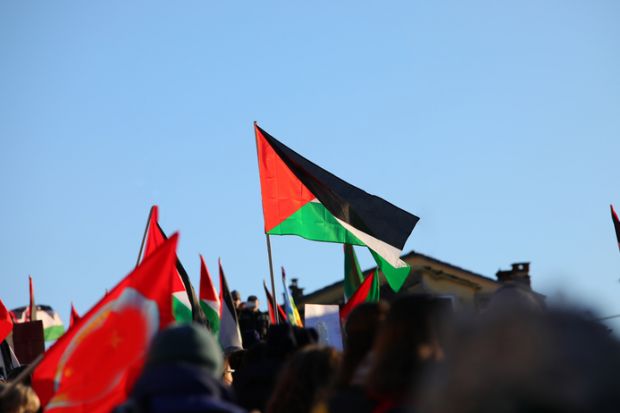A university that offered more transparency about its weapons research has been accused of both capitulating to students and trying to pull the wool over their eyes, in an illustration of the challenges posed by pro-Palestinian encampments.
The University of Sydney asked protesters to disband their five-week-old camp and instead participate in a “comprehensive independent review” of the institution’s defence and security research.
The review would scrutinise the ethics and social governance of the university’s investments, delivering recommendations to Sydney’s governing body by the end of the year. “This is the same process that led to our institutional decision to divest from modern slavery, cluster munitions, fossil fuels and tobacco,” Mark Scott, the vice-chancellor, told staff and students.
The university also flagged extra scholarships for refugees and an expanded “truth-telling process” about its interactions with Indigenous Australia. Professor Scott said Sydney’s proposal was “more comprehensive than offers accepted by other encampments around the country. We are committed to genuinely responding to the deeply held concerns of the encampment [but] I do not have the authority to decide on them unilaterally.”
Students wasted no time in rejecting the “atrocious empty deal”. In a statement posted on Facebook, Students for Palestine’s Sydney Uni chapter vowed not to “settle for compromise”.
“We will not be part of the vice-chancellor’s spin campaign, and we will not settle for anything less than the cutting of all ties with Israel and weapons companies,” it said. “The response from…university management to our encampment has only demonstrated their contempt for the Palestinian cause.”
Meanwhile, Sarah Henderson, the shadow education minister, blamed the Labor government’s “silence” for the university’s “capitulation” to the protesters’ demands.
“Rather than take disciplinary proceedings against those who established an unauthorised encampment, Mr Scott has rewarded the activists for effectively holding the university to ransom,” she said. “For weeks and months, Mr Scott has refused to take appropriate action against students and staff for antisemitic hate and vilification which has turned the University of Sydney into a cesspit of activism.”
Ms Henderson has gone further with the Australian National University (ANU), summoning it to a Senate estimates committee hearing on 6 June. “While ANU belatedly ordered the removal of the pro-Palestinian encampment, the protesters have merely moved their tents to another location on campus,” she said.
“Universities are not taking appropriate misconduct proceedings against students and staff for intimidating and vilifying others on campus.” As a university governed by federal legislation, ANU is obliged to appear before the hearing.
ANU protesters spurned an offer of “genuine and open dialogue” about the university’s investments, in a review facilitated by its governing council. ANU says it has invited students to discuss their demands with university executives on four separate occasions, with students declining on the pretext that administrators would launch disciplinary proceedings – despite assurances to the contrary.
Student representatives at Sydney and ANU did not respond to Times Higher Education’s requests for comment.
Other universities face a similarly rocky road in facilitating free speech, preventing undue disruption and ensuring staff and student safety while avoiding the violence that has accompanied police actions against US protest camps.
Curtin University committed to publish an annual list of “all sectors of university investment”, as part of an agreement to disband a protest camp at its Bentley campus.






